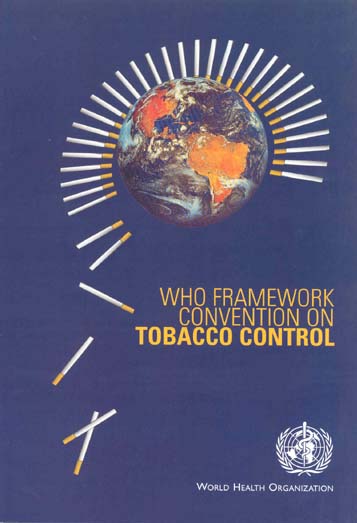 July 4, 2009 - More than 130 countries agreed late Wednesday, July 1st to expel the tobacco industry from the rest of the weeklong meeting of parties to the 2005 Framework Convention on Tobacco Control (FCTC). The U.N. backed eight-day conference of the Parties to the
July 4, 2009 - More than 130 countries agreed late Wednesday, July 1st to expel the tobacco industry from the rest of the weeklong meeting of parties to the 2005 Framework Convention on Tobacco Control (FCTC). The U.N. backed eight-day conference of the Parties to the  WHO Framework Convention on Tobacco Control is meeting in Geneva, Switzerland (June 28th - July 5th) to draft and negotiate a protocol on illicit trade in tobacco products. Governments are considering a range of measures to crack down on contraband cigarettes, including a ban on Internet sale of tobacco products and a crackdown on smuggling through duty free zones. The multinational tobacco giants such as Philip Morris International (PMI), British American Tobacco (BAT) and Japan Tobacco (JT) have a strong presence.
WHO Framework Convention on Tobacco Control is meeting in Geneva, Switzerland (June 28th - July 5th) to draft and negotiate a protocol on illicit trade in tobacco products. Governments are considering a range of measures to crack down on contraband cigarettes, including a ban on Internet sale of tobacco products and a crackdown on smuggling through duty free zones. The multinational tobacco giants such as Philip Morris International (PMI), British American Tobacco (BAT) and Japan Tobacco (JT) have a strong presence.
In contrast to the previous two negotiating sessions, this week the public gallery has been packed full of tobacco industry lobbyists. On Monday, June 29th there were more than forty people in the gallery. Twenty-three of the twenty-eight people willing to identify themselves were from the tobacco industry, including twelve from BAT, seven from JT, one from Imperial Tobacco, and one from the Tobacco Institute of South Africa.
The FCTC Article 5.3 guidelines instruct ratifying countries to “Establish measures to limit interactions with the tobacco industry and ensure the transparency of those interactions that occur” (Recommendation 2).
Big Tobacco Attempts to Smuggle Loopholes Into Global Tobacco Treaty..
"We (the governments) decided not to permit the tobacco industry to enter the meeting because they could interfere in the negotiations," said Justino Regalado Pineda, the head of Mexico's National Office for Tobacco Control. "We have to protect people from their commercial interest to poison the population."
Philip Morris International, whose representatives sat in on meetings earlier in the week, said it was "disappointed" by the decision. "It sets a dangerous precedent for the United Nations in what should be a democratic and transparent process," PMI spokesman Greg Prager said.
British American Tobacco, too, opposed the decision. "We strongly believe that a successful fight against illicit trade can only come from direct co-operation between regulators, law enforcement authorities and the tobacco industry," BAT spokesman David Betteridge said. He said the debate leading to the exclusion was "instigated" by Corporate Accountability International.
The U.S.-based watchdog group said the decision was a victory for public health. "This action sends a clear message from customs, health and law enforcement officials that it's not business as usual for the tobacco companies," the group's international policy director Kathy Mulvey said.
References: Cigarette companies kicked out of tobacco meeting by Frank Jordans, Associated Press (AP) - Boston.com, 7/2/2009.
Related news briefs: Tobacco Underground - cigarette smuggling, 6-part series..; Eliminating global illicit cigarette trade would save lives and increase tax revenue...
Bringing the World of Tobacco Control closer together..
Tobacco company giants expelled from conference to negotiate a protocol on illicit tobacco products trade..
Subscribe to:
Post Comments (Atom)


To Provide Public Awareness
Purpose
About Us
Contact Us
2008 HIGHLIGHTS
TOPIX PAPERS - 2008 & 2009..
Archive
-
▼
2009 (1446)
-
▼
06/28 - 07/05 (34)
- Let's Get It Passed - Prevent All Tobacco Traffic...
- Ukraine - lost cigarettes flooding Europe..
- South Dakota - anti-smoking leaders challenge peti...
- Florida's New Tobacco Law - non-Indian tribe membe...
- Tobacco company giants expelled from conference to...
- New South Wales politician smoking comment totall...
- FDA seeks public opinion on tobacco regulations..
- Indonesia Finance Ministry to cap tax deductions f...
- Ireland - tobacco display ban came into force on J...
- BBC: a summary - recent wave of smoking bans arou...
- PMI to buy Swedish Match South Africa..
- Big Tobacco Attempts to Smuggle Loopholes Into Glo...
- Anti-smoking drugs (non-nicotine) - Chantix and Z...
- Iowa - smoking ban has resulted in fewer people s...
- China - iIllicit cigarette operations ..
- Netherlands - Marijuana /Tobacco Cigarettes - Conf...
- Paraquay - top producer of contraband tobacco..
- Smuggled Cigarettes Give Boost To Pakistani Milita...
- Isle of Wight , England - Celebrates 2nd annivers...
- Tobacco Underground - cigarette smuggling, 6-part...
- More evidence - Casino workers face greater chance...
- In Process - EU Sweden takes over presidency..
- Tobacco control initiatives starting Wednesday, Ju...
- EU Health Chief - proposes uniform laws to regula...
- Turkey - on July 19, 2009 will mark the beginning ...
- Hong Kong - total smoking ban in effect - Wednesda...
- North Dakota - statewide anti-tobacco plan to be r...
- No one likes a tobacco user..
- More on FDA tobacco regulations..
- Thailand - nicotine gel - e-cigarettes..
- Murray Kessler leaving Altria at the end of June 2009
- Eliminating global illicit cigarette trade would s...
- Illicit cigarettes - unpleasant ingredients like i...
- Texas - to tax smokeless tobacco by weight rather ...
-
▼
06/28 - 07/05 (34)
© Copyright Notice: The content of this website is for information education purposes only and any newsbrief may be used only as "fair use" for information/education purposes with permission of the authors and providing that original references and associated reference links are included in HTML format.
0 comments:
Post a Comment